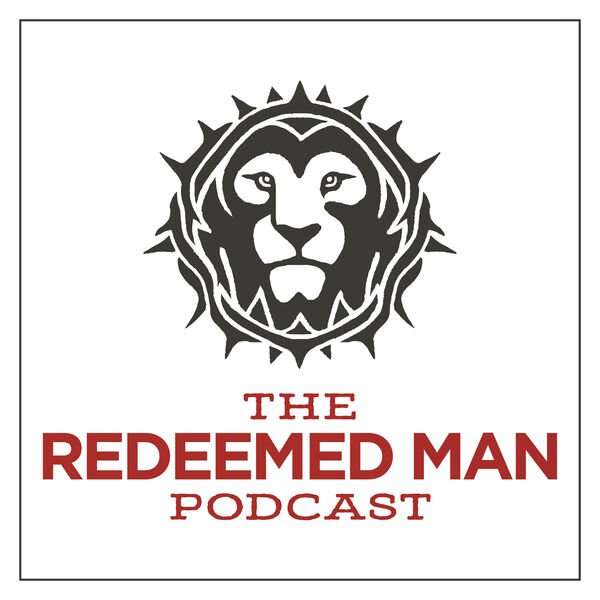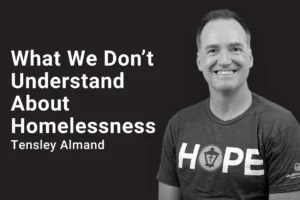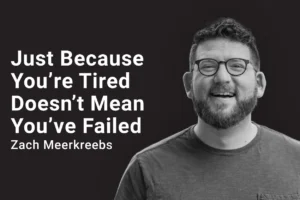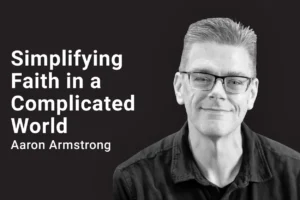God Will Tell Us Who We Are

More About The Podcast
- About
- Show Notes
About The Podcast
When we don’t have an identity or a plan, Ro Remedios says, we’re just “spitballing” life from one day to the next – drifting from vulnerable whims to reckless impulses. But when we find our identity in Christ, we discover our true purpose and the drive to chase after it. A pastor in Staten Island, New York, Ro sits down with Nate Dewberry this week to talk about discovering our true identity in Christ and what it takes to live it out. From daily prayer to intense physical activity, Ro shares what keeps him growing. And at the center of it all? A deep awareness of the forgiveness Jesus offered long before we knew to ask for it.
Show Notes
Timestamps
0:00 Intro / Thoughts on the importance of identity
4:00 Just serving the role of “warrior” isn’t enough
13:36 Remembering God’s forgiveness is essential to building a closer relationship with him
20:43 Ro’s thoughts on keeping our daily lives in balance
34:23 How physical workouts pay mental and spiritual benefits
42:32 Every man needs to learn how to fail
49:21 What we gain from focusing on our new identities rather than our old ones
53:09 Ro’s greatest joys as a husband and father
58:37 Closing thoughts: Love others the way God loves us
Discussion
- Think back to a time when you were just “spitballing” through life without a true identity or purpose. What did you think your identity was at the time? Did you ever find yourself giving in to temptation and bad ideas during this time?
Ro discussed the importance of men playing the role of both “warrior” and “worshipper” in their lives. How well would you say you play each of these roles? Do you tend to favor one over the other? If so, are there ways in which that has caused imbalance or conflict in your life
What reaction did you have to Ro’s belief that it’s important to be mindful of God’s forgiveness? Is that forgiveness something you think about often, or rarely? Think about the biggest problems or frustrations you’re dealing with right now — could pondering and praying more frequently about God’s forgiveness ease the stress of those challenges? (see Psalm 32:5)
Think about the study Ro mentioned in which people were given hot or cold cups of coffee and then asked to describe a character in a story. Now think about the outside influences and distractions that you deal with for a significant part of your day — social media, having certain TV channels on in the background, listening to certain types of music, even consuming certain foods or beverages. How might these influences be affecting the way you perceive or deal with other people? Can you identify any influences or distractions that are having a direct negative effect on your attitude or actions?
Every man deals with stress and conflict that create negative energy in his mind. Ro says he practices Brazilian jiu-jitsu to release some of that pent-up negative energy. Do you engage in any regular physical activity or exercise that serves a similar purpose? If not, what is something you could make regular time for to get physical exercise and release some of your aggression in a healthy way?
How good are you at failing? When you’re unsuccessful at something, do you shake off that failure and try to learn from it, or does it create a shame that festers in your mind for an extended period? Think of the last time you failed at something non-trivial. Is there something you could learn from that experience that you haven’t yet considered?
Ro talks about “hoopty tendencies” rooted in our old identities that we carry forward even when we start finding our new identities in Christ. Do you have any of these tendencies in your life? Do you think about these tendencies as you engage in them, or have they become things you do out of habit? What are some ways you could be more mindful about these things? (See 2 Corinthians 5:17)
Search Podcasts
Enjoyed This Episode?
Discover more inspiring episodes of The Redeemed Man Podcast wherever you tune in!
Share This Podcast
Sign up for updates
When you sign up for this mailing list, you’ll receive regular updates for The Redeemed.
More From The Redeemed Man Podcast

What We Don’t Understand About Homelessness
Tensley Almand, president and CEO of Atlanta Mission, shares his perspective on the unhoused community and how we can better understand the problems faced by those in poverty.

Just Because You’re Tired Doesn’t Mean You’ve Failed
Pastor and author Zach Meerkreebs relates his experiences at a once-in-a-lifetime spontaneous revival and how they shaped his perspective on masculinity, transparency, and humility.

Simplifying Faith in a Complicated World
Ministry leader and author Aaron Armstrong talks about the bumps in the road he experienced early in his faith journey, and how he’s trying to help others navigate the same challenges.









